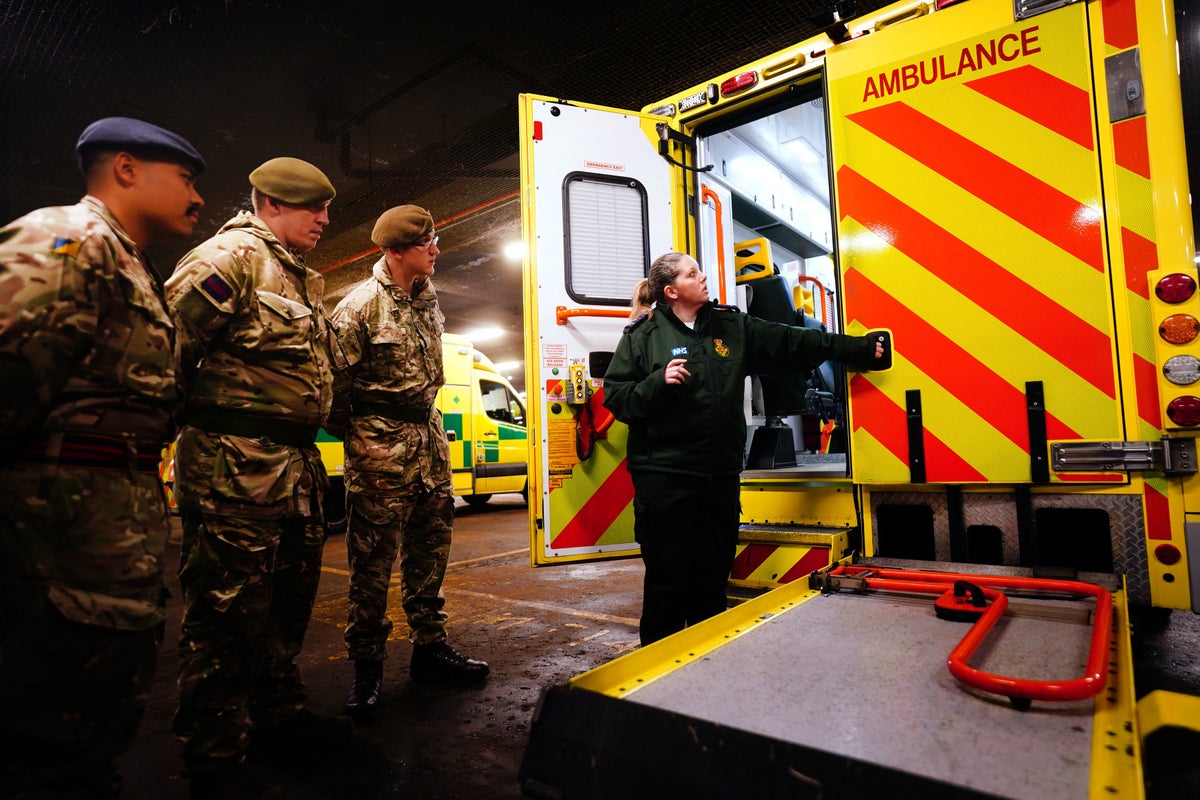
Britons have been warned not to take risks – including drinking, driving or playing certain sports – as ambulance services descended into chaos hours before a planned strike.
At least seven of 10 ambulance trusts declared “critical incidents” amid “unprecedented” pressure on services, while NHS leaders warned they could not guarantee patient safety during Wednesday’s walkout in England and Wales.
However, patients were urged to still call 999 for emergencies.
Junior health minister Will Quince warned the public to avoid unnecessary car journeys, contact sports and any other “risky activities”, while health chiefs urged people to “drink responsibly”.
But No 10 would not be drawn on what constituted “risky activity”. Mr Sunak’s spokesperson told reporters: “I’m not going to get into a list.”
Sources told The Independent that emergency and urgent care services across the country have this week experienced the highest levels of demand and delays ever seen.
In the West Midlands “extreme pressure” forced A&E departments to turn patients away.
NHS leaders wrote to Rishi Sunak late on Tuesday to say they could not guarantee patient safety during the strike action, when thousands of ambulance workers and paramedics in England walk out over pay and conditions.
NHS Confederation and NHS Providers – the groups representing trusts and other bodies – asked Mr Sunak to “be prepared to negotiate” with unions on pay.
“This is not something NHS leaders would ever say lightly, but many now tell us that they cannot guarantee patient safety tomorrow … it is clear we have entered dangerous territory,” wrote Matthew Taylor, NHS Confederation chief executive.
But the prime minister rejected the call and insisted he could not move on NHS pay amid fears it would exacerbate high inflation.
It comes just a day after nurses staged their second walkout in a separate row over pay.
Soldiers have been called in to help drive ambulances and deal with a separate strike by UK Border Force staff that threatens to paralyse airports across the country over Christmas.
Officials warned that some patients suffering from heart attacks or strokes at home may not be able to get an ambulance during Wednesday’s strike.
One national NHS figure told The Independent that “deaths and harm” were expected on Wednesday, saying many health service leaders were “gobsmacked at the reckless and wilful nature of government’s response” to industrial action.
“Harm is happening now, and we really can’t get through next few days with nurses followed by ambulances, without this creating more harm to patients,” they said.
Health secretary Steve Barclay met union officials on Tuesday to urge them to make sure category two emergency calls – including heart attacks and strokes – are answered as well as the most immediate life-threatening illnesses in category one.
But after the meeting, Unite said it had been “entirely pointless” and “insulting” because the minister refused to discuss pay.
Unison officials said they wanted the health secretary to hear the message about “likely escalation” and accused him of attempting to deflect away from wages.
Unions insisted emergency cover had been negotiated with individual ambulance trusts, leading to localised decisions about how to prioritise calls.
Sources told The Independent that North East Ambulance Services and North West Ambulance services will only be able to guarantee a response to category one cases – the most immediately life-threatening that require a response within 7 minutes – but not category two. That means patients with suspected heart attacks and strokes, who need a response within 18 minutes, might not get an ambulance.
Some category two calls in the most under-pressure parts of the country may only be answered if an incident happens in a “public place”, said a Unison source, since patients suffering at home will be deemed more comfortable.
“[People] are taking themselves to hospitals in a taxi because they can’t get the ambulance,” Rachel Harrison, the GMB union’s national secretary, told MPs on the health select committee. “People are dying waiting to be handed over A&E departments – that’s happening today. That is one of the very reasons that has driven us to this dispute.”
Sara Gorton, Unison’s head of health, said it “looks likely there will be significant escalation in the New Year” – and refused to rule out the possibility that 999 call centre staff could join ambulance road crews in fresh action from January.
Mr Barclay said it was “disappointing” that ambulance staff were going ahead with strike action. The health secretary said he had urged union bosses “to honour their commitment to provide responses to life-threatening emergency calls”.
Downing Street admitted Mr Sunak had not chaired Cobra meetings on the crisis or met the unions. The NHS disputes were not raised at Tuesday’s cabinet meeting, No 10 said – but instead plans were discussed for the King’s coronation next year.
Meanwhile, a new poll by Savanta found just 11 per cent of the public blame nurses for the strike, while more than half, 54 per cent, blame the government and a quarter, 27 per cent, the trade unions.
Unison’s ambulance strike is running from noon until midnight on Wednesday while the GMB action runs from midnight to midnight, and Unite’s action is from midnight to midday on Wednesday.







